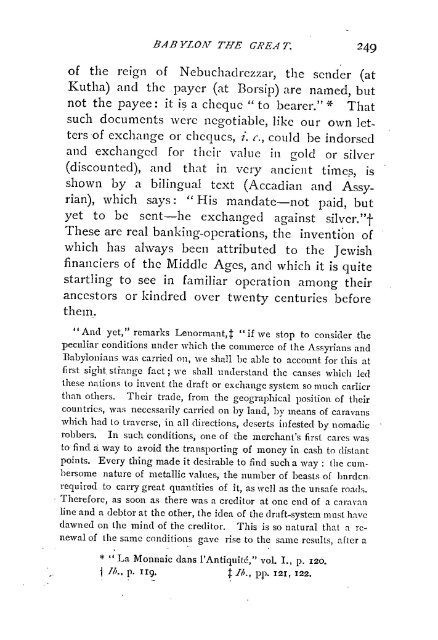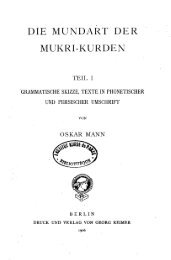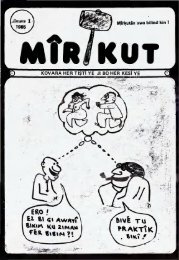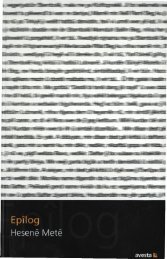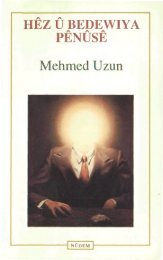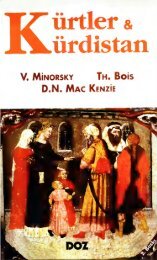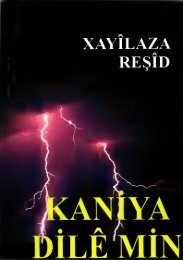- Page 3 and 4:
^ 5t^^' ^ ., " V',! p-ii!^t \ ..Htk
- Page 5 and 6:
Entered at Stationers' HallBy T. Fi
- Page 7 and 8:
IVCLASSIFIED CONTENTS..and follower
- Page 9 and 10:
^'CLASSIFIED CONTENTS.' ' VI.Migrat
- Page 11 and 12:
VI"CLASSIFIED CONTENTS.introducedby
- Page 13 and 14:
CLASSIFIED CONTENTS.yiee. § 4. The
- Page 15 and 16:
XllLIST OF ILLUSTRATIONS.pagbSEPULC
- Page 18 and 19:
PRINCIPAL WORKS READ OR CONSULTED,I
- Page 20 and 21:
PRINCIPAL WORKS CONSULTED.xviiMOlle
- Page 22:
PRINCIPAL DATES GIVEN IN THISVOLUME
- Page 26 and 27:
THE STORY OFMEDIA, BABYLON,AND PERS
- Page 28 and 29:
A NOTABLE RELIGIOUS SURVIVAL. 3popu
- Page 30 and 31:
A NOTABLE RELIGIOUS SURVIVAL.J6. Th
- Page 32 and 33:
ANOTABLE RELIGIOUS SURVIVAL.also kn
- Page 34 and 35:
A NOTABLE RELIGIOUS SURVIVAL. 9and
- Page 36 and 37:
A NOTABLE RELIGIOUS SURVIVAL.IIeven
- Page 38 and 39:
A NOTABLE RELIGIOUS SURVIVAL. 1 3an
- Page 40 and 41:
A NOTABLE RELIGIOUS SURVIVAL. 1 5"
- Page 42 and 43:
II.the PROPHET OF KKAN THE AVESTA.I
- Page 44 and 45:
THE Prophet of eran.i^ing to admit
- Page 46 and 47:
tiie prophet of eran. 21mous propor
- Page 48 and 49:
the PROPHET OF ERAN. 23which of the
- Page 50 and 51:
THE PROPHET OF ERAN. 2$the royal fa
- Page 52 and 53:
THE PROPHET OF ERAN. 27where beyond
- Page 54 and 55:
,,^^wl_y/^/j n^uX^y-fr'iiw jjotj^i
- Page 56 and 57:
THE PROPHET OF ERAN. 3 1Gathas are
- Page 58 and 59:
THE PROPHET OF ERAN.33date It will
- Page 60 and 61:
ARYAN MYTHS. 35cidentally finds som
- Page 62 and 63:
ARYAN' MYTHS. 375. There was a time
- Page 64 and 65:
ARYAN MYTHS. 39 ,for Chaldea, and s
- Page 66 and 67:
ARYAN MYTHS.4IHe is, on the contrar
- Page 68 and 69:
ARYAN MYTHS. 43ber seven. It has al
- Page 70 and 71:
ARYAN MYTHS. 45perficial as our att
- Page 72 and 73:
ARYAN MYTHS. 47ceed in piercing. hi
- Page 74 and 75:
ARYAN MYTHS. 49dwelt in the consecr
- Page 76 and 77:
ARYAN MYTHS. 51the purest and most
- Page 78 and 79:
ARYAN MYTHS. 53setting sun, in the
- Page 80 and 81:
ARYAAr MYTHS. 55who crowd the borde
- Page 82 and 83:
ARYAN MYTHS IN THE AVESTA. '57curti
- Page 84 and 85:
ARYAN MYTHS IN THE AVESTA. 50suppli
- Page 86 and 87:
ARYAN MYTHS IN THE AVESTA. 6lidenti
- Page 88 and 89:
ARYAN MYTHS IN TIIE AVESTA. 63the d
- Page 90 and 91:
Aryan myths in the avesta. 65go up
- Page 92 and 93:
ARYAN myths IN THE AVESTA. 6/and dr
- Page 94 and 95:
ARYAN- MYTHS IN THE AVESTA.6ghorse,
- Page 96 and 97:
ARYAA^ MYTHS IN THE AVESTA.7Ipromis
- Page 98 and 99:
ARYAN MYTHS IN THE AVESTA. 73the me
- Page 100 and 101:
ARYAN MYTHS IN THE AVESTA. 7515. Be
- Page 102 and 103:
ARYAN MYTHS IN THE AVESTA.pof all h
- Page 104 and 105:
ARYAN MYTHS IN THE AVESTA. 79and st
- Page 106 and 107:
ARYAN MYTHS IN THE AVESTA.8lnations
- Page 108 and 109:
ARYAN MYTHS IN TIIE AVESTA. 83diffe
- Page 110 and 111:
Aryan myths in the avesta. 85them u
- Page 112 and 113:
ARYAN MYTHS, IN THE AVESTA. 87four-
- Page 114 and 115:
ARYAN MYTHS IN THE AVES7A. 89spirit
- Page 116 and 117:
ARYAN MYTHS IN THE AVESTA.9Ihis swa
- Page 118 and 119:
ARYAN MYTHS IN THE AVESTA. 93to his
- Page 120 and 121:
V.THE G,A.TT-TAS,THE, Y.\SNA Ol'' S
- Page 122 and 123:
THE GATHAS.gfhad in themselves the
- Page 124 and 125:
THE GATHAS. 99harm on the settlemen
- Page 126 and 127:
THE GATHAS.lOItution of agriculture
- Page 128 and 129:
THE GATHAS. 103"5. Then of these tw
- Page 130 and 131:
* THE GATHAS. 105of Faith known as
- Page 132 and 133:
TIIE GATHAS. 107Most noticeable is
- Page 134 and 135:
THE GATHAS.IO9marks the same schola
- Page 136 and 137:
THE GATHAS.Illnot once mentioned in
- Page 138 and 139:
VI.MIGRATIONS AND FOREIGN INFLUENCE
- Page 140 and 141:
6. " taitidAna" (pen6m)cloth worn b
- Page 142 and 143:
THE VENDIDAD.~THE LESSER AVESTA.11^
- Page 144 and 145:
TONGS TO 'PKIM SACRED FIRE.SAUCERS
- Page 146 and 147:
THE VENDIDAD. THE LESSER AVESTA. 12
- Page 148 and 149:
TIIE VENDIDAD. TIIE LESSER AVESTA.
- Page 150 and 151:
THE VENDIDAD. THE LESSER AVESTA. 12
- Page 152 and 153:
SECTION,TOTAL HEIGHT Ai:OUT l6 FEET
- Page 155 and 156:
130 MEDIA, BABYLON, AND PERSIA.to p
- Page 157 and 158:
132 MEDIA, BABYLON, AND PERSIA." Ur
- Page 159 and 160:
134- MEDIA, BABYLON, AND PERSIA.nat
- Page 161 and 162:
136 MEDIA, BABYLON, AND PERSIA.the
- Page 163 and 164:
138 MEDIA, BABYLON, AND PERSIA.to.A
- Page 165 and 166:
I40MEDLA, BABYLON, AND PERSIA.made
- Page 167 and 168:
142 MEDIA, BABYLON. AND PERSIA.male
- Page 169:
144 MEDIA, BABYLON, AND PERSIA.the
- Page 172 and 173:
THE VENDIDAD. THE LESSER AVESTA. 14
- Page 174 and 175:
THE VENDIDAD. TIIE LESSER AVESTA. I
- Page 176 and 177:
5il6. RUIN OF ATESH-G.^H AT FIR0Z-
- Page 178 and 179:
«rf^-!f*> »vft' -1t^^'=?r^>!^»'1
- Page 180 and 181:
THE VENDIDAD. TIIE LESSER AVESTA. I
- Page 182 and 183:
THE VENDIDAD. THE LESSER AVESTA. 1
- Page 184 and 185:
THE VENDIDAD. THE LESSER AVESTA. 1
- Page 186 and 187:
THE VENDIDAD. THE LES.^ER AVESTA. l
- Page 188 and 189:
THE VENDIDAD. THE LESSER AVESTA. 16
- Page 190 and 191:
THE VENDIDAD. THE LESSER AVESTA. 16
- Page 192 and 193:
THE VENDIDAD. THE LESSER AVESTA. 16
- Page 194 and 195:
VII.THE LAST DAYS OF JUDAH.1. While
- Page 196 and 197:
THE LAST DAYS OF fUDAH.17Iat length
- Page 198 and 199:
THE LAST DAYS OF fUDAH. 173a short
- Page 200 and 201:
THE LAST DAYS OF fUDAH. 1/5warfare,
- Page 202 and 203:
THE LAST DAYS OF JUDAH. 1 77tives,
- Page 204 and 205:
THE LAST DAYS OF JUDAH. 179soul fil
- Page 206 and 207:
THE LAST DAYS OF JUDAH.iSlthe king
- Page 208 and 209:
THE LAST DAYS OF JUDAH. ' I S3of th
- Page 210 and 211:
THE LAST DAYS OF JUDAH. 185'' There
- Page 212 and 213:
LYDIA AND ASIA MINOR * 1 87Halys (t
- Page 214 and 215:
LYDIA AND ASIA MINOR. 189into an ac
- Page 217 and 218:
1 8. LYCIAN K0(
- Page 219:
1 8. LYCIAN KOCK-TOMBS AT MYRA,Face
- Page 222 and 223:
192 MEDIA, BABYLON, AND PERSIA.plun
- Page 224 and 225:
oH'4uaiu.-MO7-rt^>.ACkO'Ay
- Page 226:
196 MEDIA, BABYLON, AND PERSLA.7. I
- Page 229: igg 24. SEPULCHRAL MONUMENT AT XANT
- Page 232 and 233: 202 MEDIA, BABYLON, AND PERSIA.the
- Page 234 and 235: 204 MEDIA, BABYLON, AND PERSIA.peop
- Page 236 and 237: 206 MEDIA, BABYLON, AND PERSIA.peni
- Page 238 and 239: 208 MEDIA, BABYLON, AND PERSIA.like
- Page 240 and 241: 2IO ' MEDIA, BABYLON, AND PERSIA. ,
- Page 242 and 243: 212 MEDIA, BABYLON, AND PERSIA.carp
- Page 244 and 245: 2;i4 media; babylon, and persia.mom
- Page 246 and 247: 2l6MEDIA, BABYLON, AND PERSIA.count
- Page 248 and 249: 2l8MEDIA, BABYLON, AND PERSLA.ments
- Page 250 and 251: 220 MEDIA, BABYLON, AND PERSIA.i8.
- Page 252 and 253: 222 MEDIA, BABYLON, AND PERSIA.long
- Page 254 and 255: 224 MEDIA, BABYLON, AND PERSIA.a ne
- Page 256 and 257: 226 MEDLA, BABYLON, AND PERSIA.at s
- Page 258 and 259: 228 MEDLA, BABYLON, AND PERSIA.bese
- Page 260 and 261: 230 MEDIA, BABYLON, AND PERSLA.ing
- Page 262 and 263: 232MEDIA, BABYLON, AND PERSIA.desce
- Page 264: 234 MEDLA, BABYLON, AND PERSIA.that
- Page 267 and 268: aOSUiWCOguToOa
- Page 269 and 270: BABYLON THE GREAT. 239Four hundred
- Page 271 and 272: BABYLON THE GREAT.24IHebrew eye-wit
- Page 273 and 274: BABYLON TIIE GREAT. 243fashion. . .
- Page 275 and 276: BAB YLON THE GREA T.245. lets cover
- Page 277: BABYLON THE GREAT. 247etc., were bu
- Page 281 and 282: BABYLON TIIE GREAT. 25 1tablets mig
- Page 283 and 284: BABYLON THE GREAT. 253prepare and s
- Page 285 and 286: BABYLON THE GREAT. 255illness, that
- Page 287 and 288: Babylon THE GREAT. 257as principals
- Page 289 and 290: BABYLON THE GREAT. 359and his cloth
- Page 291 and 292: XMEDIA AND THE RISE OF PERSIA.I. Ha
- Page 293 and 294: MEDIA AND THE RISE OF PERSIA. 263be
- Page 295 and 296: MEDIA AND TIIE RISE OF PERSIA. 2655
- Page 297 and 298: MEDIA AND TIIE RISE OF PERSIA. 267p
- Page 299 and 300: ' MEDIA AND THE RISE OF PERSIA. 269
- Page 301 and 302: MEDLA AND THE RISE OF PERSIA. 27!an
- Page 303 and 304: MEDIA AND THE RISE OF PERSIA. 273"
- Page 305 and 306: MEDIA AND THE RISE OF PERSLA. 275ad
- Page 307 and 308: MEDIA AND THE RISE OF PERSIA.ZjJthe
- Page 309 and 310: MEDIA AND THE RISE OF PERSIA. 279ti
- Page 311 and 312: MEDIA AND TIIE RISE OF PERSIA.28lam
- Page 314 and 315: 284 MEDIA, BABYLON, AND PERSIA..ind
- Page 316 and 317: 286 MEDIA, BABYLON, AND PERSLA.as t
- Page 318 and 319: 288 MEDIA, BABYLON, AND PERSIA.Had
- Page 320 and 321: 290 MEDIA, BABYLON, AND PERSLA.2. A
- Page 322 and 323: 292 - .MEDIA, BABYLON, AND PERSIA.h
- Page 324 and 325: 294 MEDIA, BAB'YLON, AND PERSIA.and
- Page 326 and 327: 296 MEDIA, BABYLON, AND PERSLA.As t
- Page 328 and 329:
298 MEDIA, BABYLON, AND PERSLA.she
- Page 330 and 331:
300 MEDIA, BABYLON, AND PERSIA.own
- Page 332 and 333:
302. MEDIA, BABYLON, AND PERSIA.blo
- Page 334 and 335:
304MEDIA, BABYLON, AND PERSIAis a c
- Page 336 and 337:
306 MEDIA, BABYLON, AND PERSIA.his
- Page 338 and 339:
3o8MEDIA, BABYLON, AND PERSIA.soon
- Page 340 and 341:
3IOMEDIA, BABYLON, AND PERSIA.belie
- Page 342 and 343:
312 MEDIA, BABYLON, AND PERSLA.plac
- Page 344 and 345:
314 MEDIA, BABYLON, AND PERSIA,fire
- Page 346 and 347:
3X6MEDIA, BABYLON, AND PERSIA.tione
- Page 348 and 349:
3lSMEDIA, BABYLON, AND PERSIA.20. T
- Page 350 and 351:
320 MEDIA, BABYLON. AND PERSIA.of t
- Page 352 and 353:
322 MEDIA, BABYLON, AND PERSIA.been
- Page 354 and 355:
324 MEDIA, BABYLON, AND PERSIA.foll
- Page 356 and 357:
326 MEDIA, BABYLON, AND PERSIA.24.
- Page 358 and 359:
328 MEDIA, BABYLON, AND PERSIA.in t
- Page 360 and 361:
330 MEDIA, BABYLON, AND PERSIA.like
- Page 362 and 363:
333 MEDIA, BABYLON, AND PERSLA.fabl
- Page 364 and 365:
334 MEDIA, BABYLON, AND PERSIA.Dieu
- Page 366 and 367:
33^MEDIA, BABYLON, AND PERSIA.colle
- Page 368 and 369:
338 MEDIA, BABYLON, AND PERSIA.'dec
- Page 370 and 371:
34°MEDIA, BABYLON, AND PERSIA.impr
- Page 372 and 373:
342 MEDIA, BABYLON, AND PERSIA.is a
- Page 374 and 375:
XII.kambyses, 529-522 B.C.1. Kambys
- Page 376 and 377:
34^MEDIA, BABYLON, AND PERSIA.or co
- Page 378 and 379:
348 MEDIA, BABYLON, AND PERSIA.used
- Page 380 and 381:
350 MEDIA, BABYLON, AND PERSIA.*plo
- Page 382 and 383:
352 MEDIA, BABYLON, AND PERSIA.was
- Page 384 and 385:
354 MEDIA, BABYLON, AND PERSIA.tion
- Page 386 and 387:
356 MEDIA, BABYLON, AND PERSIA.nort
- Page 388:
358 MEDIA, BABYLON, AND PERSIA.to f
- Page 391 and 392:
XIII.DAREIOS I, TIIE SON OF HYSTASP
- Page 393 and 394:
54. dareios i. on lus throne, upbor
- Page 395 and 396:
DAREIOS I. : CIVIL WARS. 365princes
- Page 397 and 398:
2 S
- Page 399 and 400:
DAREIOS I. : CIVIL WARS. 369which i
- Page 401 and 402:
DARIEOS I. .-CIVIL WARS.mof burning
- Page 403 and 404:
57. BUILDING KNOWN AS " RUSTEM's TO
- Page 405 and 406:
375
- Page 408 and 409:
378 MEDIA, BABYLON, AND PERSLA.wors
- Page 410 and 411:
380 MEDIA, BABYLON, AND PERSIA.ment
- Page 412 and 413:
382 MEDIA, BABYLON, AND PERSLA.sion
- Page 414 and 415:
XIV.DAREIOS I. SECOND PERIOD :YEARS
- Page 416 and 417:
386 MEHIA, BABYLON, AND PERSIA.pulo
- Page 418 and 419:
388 MEDIA, BABYLON, AND PERSIA.the
- Page 420 and 421:
390 MEDIA^ BABYLON, AND PERSIA.nort
- Page 422 and 423:
392 MEDIA, BABYLON, AND PERSIA.tile
- Page 424 and 425:
394 MEDIA, BABYLON, AND PERSIA.call
- Page 426 and 427:
S
- Page 428:
398 MEDIA, BABYLON, AND PERSIA.scul
- Page 431 and 432:
14->;MSZ .39 E- ei of-' S6 "O _"o .
- Page 433 and 434:
66. D"AREIOS FIGHTING A MONSTERA DA
- Page 435 and 436:
67. DOCK OF PALACE OF DAREIOS, PERS
- Page 437 and 438:
..,1)7,*'ip^'fj^^.' :. -^J- -^i5.,-
- Page 440 and 441:
4IO MEDIA, BABYLON, AND PERSIA. 'In
- Page 442 and 443:
XV.DAREIOS I. : THIRD PERIOD : FORE
- Page 444 and 445:
414 , MEDIA, BABYLON, AND PERSLA.By
- Page 446 and 447:
4l6MEDIA, BABYLON, AND PERSLA.or "A
- Page 448 and 449:
4l8MEDIA, BABYLON, AND PERSIA.tions
- Page 450:
420 MEDIA, BABYLON, AND PERSIA.extr
- Page 453 and 454:
mmmj'y^ ^iSm ^"^^-i 1mmilt!liml[£&
- Page 455 and 456:
DAREIOS I. : FOREIGN WARS. 425these
- Page 457 and 458:
DAREIOS I. : FOREIGN WARS. 427pecte
- Page 459 and 460:
DAREIOS I : FOREIGN WARS. 429will n
- Page 462 and 463:
432 MEDIA, BABYLON, AND PERSIA.oint
- Page 465 and 466:
INDEX,Aahmes, see Amasis.Ab-Karkha,
- Page 467 and 468:
INDEX.Ai;xa-Mazda, 62 ; his demands
- Page 469 and 470:
INDEX.439Don, see Tana'is.Dorians,
- Page 471 and 472:
INDEX. 441Josiah, submits to Necho,
- Page 473 and 474:
INDEX. 443kings, 144 ; their origin
- Page 475 and 476:
INDEX. 445196 ; king of, sends gift
- Page 477 and 478:
INDEX. 447sians under the Akhaemeni


